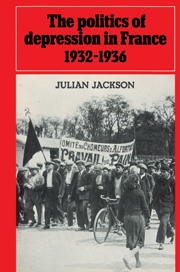Crossref Citations
This Book has been
cited by the following publications. This list is generated based on data provided by Crossref.
Kemp, T.
1989.
The Cambridge Economic History of Europe from the Decline of the Roman Empire.
p.
691.
Boyce, Robert
1989.
Paths to War.
p.
55.
Mathias, Peter
and
Pollard, Sidney
1989.
The Cambridge Economic History of Europe from the Decline of the Roman Empire.
Margairaz, Michel
1991.
L’État, les finances et l’économie. Histoire d’une conversion 1932-1952. Volume II.
p.
1369.
Balderston, Theo
1993.
Coping with catastrophes: economic policy, performance and institutions in troubled times, 1919–1955.
The Historical Journal,
Vol. 36,
Issue. 2,
p.
455.
KEELER, JOHN T. S.
1993.
Opening the Window for Reform.
Comparative Political Studies,
Vol. 25,
Issue. 4,
p.
433.
FEATHERSTONE, KEVIN
1994.
Jean Monnet and the ‘Democratic Deficit’ in the European Union.
JCMS: Journal of Common Market Studies,
Vol. 32,
Issue. 2,
p.
149.
1996.
Golden Fetters.
p.
xi.
1996.
Golden Fetters.
p.
v.
1996.
Golden Fetters.
p.
ix.
1996.
Golden Fetters.
p.
xix.
Ripsman, Norrin M.
and
Blanchard, Jean‐Marc F.
1996.
Commercial liberalism under fire: Evidence from 1914 and 1936.
Security Studies,
Vol. 6,
Issue. 2,
p.
4.
Eichengreen, Barry
1996.
Golden Fetters.
p.
3.
1996.
Golden Fetters.
p.
iv.
Eichengreen, Barry
1996.
Golden Fetters.
p.
67.
1996.
Golden Fetters.
p.
xvi.
Ferderer, J. Peter
and
Zalewski, David A.
1999.
To Raise the Golden Anchor? Financial Crises and Uncertainty During the Great Depression.
The Journal of Economic History,
Vol. 59,
Issue. 3,
p.
624.
Jackson, Peter
2000.
Naval policy and national strategy in France, 1933–1937.
Journal of Strategic Studies,
Vol. 23,
Issue. 4,
p.
130.
Zdatny, Steve
2006.
Fashion, Work, and Politics in Modern France.
p.
131.
Feiertag, Olivier
2006.
Wilfrid Baumgartner.
p.
727.





